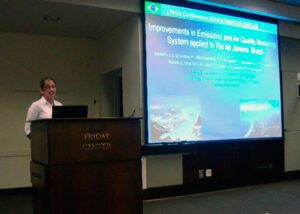Air Quality Conference Brazil
3RD CMAS SOUTH AMERICA 2017
Início » 2017 – 3th Cmas South America
The Air Quality Conference 2017 and 3RD CMAS SOUTH AMERICA is intended for researchers and professionals from industry, public and academic sectors from all around the world and everyone who wishes to take part in engineering solutions to maintain and improve the quality of life of populations living in urban and rural areas regarding air pollution nuisance and health impact.

Air quality pollution has been a major problem and a matter of global concern for decades. High concentrations of different air pollutants are particularly harmful to large cities residents, where numerous anthropogenic activities strongly influence the quality of air. This session is dedicated to the application of air quality modeling studies.
Work in recent years has vastly improved the science of air quality and methodologies for modeling and analyzing the distribution of air pollutants at various temporal and spatial scales. Such advances were motivated by the results from the multitude of applications and evaluations of air quality models that addressed various research, development and regulatory modeling issues. We seek abstracts that illustrate innovative methodologies and process algorithms in air quality modeling. This session’s topics include:
This session is dedicated to the application of innovative methodologies for preparing and processing emissions for air quality modeling applications. Techniques to improve estimates of wild fires, dust and biogenic emissions are of special interest for this session. This session’s topics include:
Updates to inventories and emissions processing
Evaluation of air quality modeling systems (including meteorological and emissions models) is a key to identify the integrity of such modeling systems for various applications at various spatial and temporal resolutions. Abstracts are invited to present results of model evaluation studies, with emphasis on new techniques for model evaluation. This session’s topics include:
Air quality models have become indispensable tools in air quality management. This session will focus on research towards science-based policy and applications of models as decision support tools. The session will cover various applications that would inform the decision-making process for air quality improvement. Work that integrates air quality science and modeling with other relevant disciplines such as policy, economics, health, or climate science, and with models used in those disciplines, will be highlighted. Conceptual efforts demonstrating or exploring integrated assessment models and decision support systems will be covered as well. This session topics include:
Air quality models continue to be important tools for guiding decision makers in preparing State Implementation Plan (SIP) applications to set standards for compliance. We seek abstracts that describe how air quality models are used in specific applications, with particular emphasis on the types of sensitivity and diagnostic analyses employed and on the model evaluation studies that were conducted for various applications. This session topics include:
Most of the research on atmospheric dispersion is concerned with the examination of mean concentrations over a given time, typically minutes or hours in length. However, many studies have shown that the mean concentration field alone is not sufficient for estimating the potential hazards from pollutant releases in the atmosphere, for example in the case of flammability, malodour nuisance and, often, toxicity. Odour is an increasingly sensitive issue and complaints of odour nuisance emitted by domestic and industrial wastewater treatment plants. The problems associated with malodour nuisance occur with sufficient frequency and severity to warrant regulatory intervention. It is therefore important to develop, validate and use appropriate dispersion modelling approaches in order to investigate odour dispersion and provide regulatory authorities with relevant information.
Meteorological processes are critical to all aspects of air pollution in particular emissions, dispersion and transport, dry and wet deposition, photochemical and chemical reactions, and pollutant concentrations. The accuracy in modeling basic meteorological parameters such as wind speed and direction, and temperature as well as processes such as cloud formation and boundary layer characteristics are fundamental to the accuracy of air quality model simulations. This session topics include:
Papers in this session are devoted to analyzing data from both conventional and remote-sensing observational platforms. In particular, presentations are invited on the integration of data collected from different platforms, and on the use of new satellite data products in air quality modeling. This session’s topics include:
Air Pollution Control is an important area for the air pollution issue aiming to reduce or eliminate the emission into the atmosphere of substances that can affect the air quality. The performance of the techniques used to control the emissions must be effective in order to achieve the legal limitations imposed by the country or states government for the protection of the environment and public health. Therefore, with the increase of the restrictions of emission, the Research for efficiency improvements of these techniques is a very important subject. Also it is crucial to develop technologies with low Capital and Operational costs. This session is about the studies dedicated to the Air Pollution Control innovative techniques to control the emissions of particulate and gases. This session topics include:
The Air Pollution Conference Brazil and 6th CMAS South America is intended for researchers and professionals from industry, public and academic sectors from all around the world and everyone who wishes to take part in engineering solutions to maintain and improve the quality of life of populations living in urban and rural areas regarding air pollution nuisance and health impact.

Recent Comments